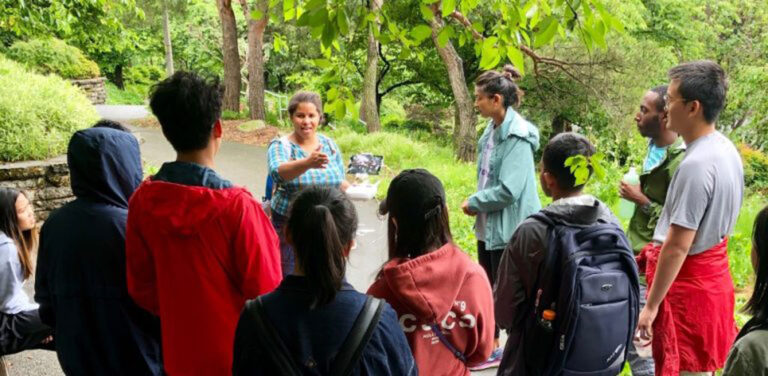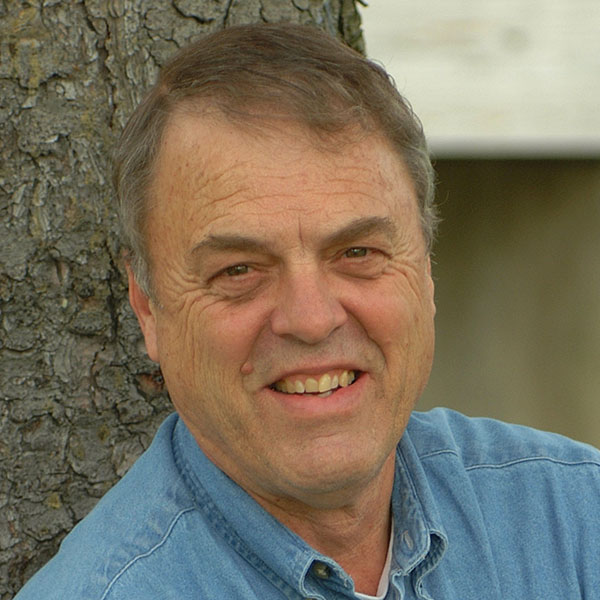Geography and Climate Change in the 21st Century: Keeping our Eyes on the Prize
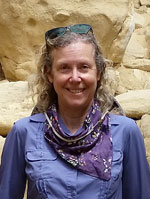 Geography has many grand challenges for the 21st Century: combatting climate change and biodiversity loss; providing clean water; investigating safe refuge, health care, education, and poverty; preparing for natural hazards, and ensuring food security among many. Another grand challenge is ensuring a harassment-, bullying-, and bias-free Geography workplace, to ensure that progress continues on our other grand challenges. This is a “climate change” that we must unite around. This is not an easy topic to write about, but it is my civic and professional duty.
Geography has many grand challenges for the 21st Century: combatting climate change and biodiversity loss; providing clean water; investigating safe refuge, health care, education, and poverty; preparing for natural hazards, and ensuring food security among many. Another grand challenge is ensuring a harassment-, bullying-, and bias-free Geography workplace, to ensure that progress continues on our other grand challenges. This is a “climate change” that we must unite around. This is not an easy topic to write about, but it is my civic and professional duty.
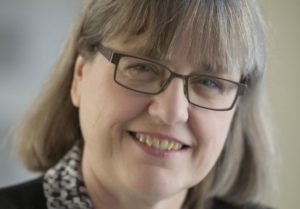
On this week that Nobel Prizes are being announced, a cloud hangs over the academy and over our justice system. The Nobel Prize for Literature for 2018 will not be awarded because of sexual and financial misconduct allegations against committee members, culminating in one key figure being sentenced to jail this week for rape. Another news item notes how few women have been awarded Nobel Prizes and raises questions about bias. Fortuitously, the Nobel Prize committee just awarded Dr. Donna Strickland, the third female scientist in history (and first in 55 years), a Physics Nobel, shared three ways by scholars working on laser physics.
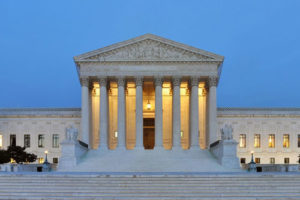
Meanwhile, the U.S. has just been through wrenching hours of testimony regarding sexual assault allegations, as part of the hearings to appoint the next U.S. Supreme Court Justice. We have not progressed far since Anita Hill testified on Capitol Hill. Another professional woman, separated by nearly three decades from Dr. Hill’s experience, gave solemn testimony last week. Both women came forward out of a sense of civic duty and opened their professional and personal lives and families to public scrutiny and far worse, for no personal gain. This testimony contrasted sharply with a privileged candidate for the highest judicial seat angrily responding during his turn, especially towards female questioners. But these are not the only allegations that have crossed our news feeds or desks. I have learned of recent sexual misconduct allegations, proceedings, and findings against a geographer at a U.S. institution. I also have received a signed request from AAG members for our organization to address a specific case and, more broadly, these issues in more depth. Broadly speaking, as a former administrator, I cannot discuss specifics of cases because victims, witnesses, and accused (and exonerated) parties must receive due process and be protected from retaliation in these proceedings. Meanwhile, the challenge for AAG is what can we do, as a professional organization, to improve the climate for and among our members?
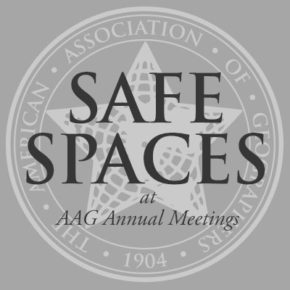 As I wrote in my September 2018 column, the AAG Council appointed a committee to work on improving and strengthening our AAG Meeting Conduct policies, to make our Annual Meeting a safer place. The AAG Inclusion Committee will be presenting their findings and recommendations to AAG Council to consider this fall, so we can move forward with a new plan. I am grateful to the committee, led by Dr. Lorraine Dowler, for their hard work on this. Stepwise, there are other ways we can address the issue of harassment, bullying, and bias in our community and institutions. One of the informal observations by the Inclusion Committee was that science organizations seem to be ahead of the issues in several senses. For the rest of this column, I will share some of the best practices of other organizations, and set an agenda for where we may ask the AAG Council and our membership to go next.
As I wrote in my September 2018 column, the AAG Council appointed a committee to work on improving and strengthening our AAG Meeting Conduct policies, to make our Annual Meeting a safer place. The AAG Inclusion Committee will be presenting their findings and recommendations to AAG Council to consider this fall, so we can move forward with a new plan. I am grateful to the committee, led by Dr. Lorraine Dowler, for their hard work on this. Stepwise, there are other ways we can address the issue of harassment, bullying, and bias in our community and institutions. One of the informal observations by the Inclusion Committee was that science organizations seem to be ahead of the issues in several senses. For the rest of this column, I will share some of the best practices of other organizations, and set an agenda for where we may ask the AAG Council and our membership to go next.
On the topic of equity, The American Geophysical Union (AGU) President and President-elect have raised the issue of gender equity in their awards, and tasked their honors committee to study how to improve in this area, and their members to be more proactive in nominating deserving diverse members. Prompted by this published discussion, an AAG member sent me a query about gender balance in AAG Awards, and asked if AAG has undertaken a study to see where we stand, and expressed optimism that we are doing well. I would expand this to a broader examination of equity in terms of how do we honor, elevate, and retain all protected classes in our profession. This is another of our grand challenges then, to assess the equity in our recognition systems.
Also on the topic of honors, the American Association for the Advancement of Science (AAAS) Board just passed a policy and procedure to revoke AAAS Fellowship status due to “proven scientific misconduct, serious breaches of professional ethics, or when the Fellow in the view of AAAS otherwise no longer merits the status of Fellow.“ This includes sexual misconduct. This is another grand challenge that should be considered by our organization and others as a next step, again building on our Safe Meetings, anti-harassment, and ethics policies.
Broadening out on consequences for bullying, harassment, bias, and workplace hostility, AAG needs to work in partnership with our home institutions and our sibling organizations to ensure seamless reporting, support, and action structures to deal with complicated sets of allegations and due process for all, especially when they cross multiple jurisdictions. I have heard instances where a victim was harassed at a meeting, and the perpetrator was not from their home institution, and the event was co-sponsored by two organizations. Unfortunately, the home institution had limited capacity to deal with this. Therefore, these kinds of cases can fall through institutional jurisdictional gaps when it comes to Title IX enforcement. A further complication to protect victims and witnesses from retaliation is that they are not identified and do not know the penalties handed out to perpetrators. Thus, it will often take a very long time for investigation outcomes to see the full light of day. Creating a reporting structure and clearinghouse in partnership with our home institutions is therefore another one of our grand challenges. For AAG Meetings we have made progress to build on with our Inclusion Committee, combined with our foundational anti-harassment policies, and our existing standing committee that hears meeting harassment cases.
I wish that Geography and other organizations’ “Presidential Columns” did not have to be about demanding that our memberships be more respectful and more inclusive of one another; for civility; and for basic human rights. It is the responsibility of leadership to listen to our members; to shine the light on timely and difficult professional issues that have always plagued our fields, not only recently; and to act to make our professional communities kinder, more inclusive, and in the words of Former AAG President Victoria Lawson, “caring” places, of “human and environmental well-being” (Lawson, 2009, Antipode 41(1): 210-214). I believe we geographers are all on the same page with treasuring our planet and our environment, but we still have to work on valuing and respecting each other. I salute the vast majority of geographers who do care, the women and men who write to me, who sign your names with sincerity, hope, and courage to share ideas and ask for changes, and who are already part of the positive “climate change” in Geography.
Please share your ideas with me at: slbeach (at) austin (dot) utexas (dot) edu
— Sheryl Luzzadder-Beach, President, AAG
Professor, Geography and the Environment, The University of Texas at Austin
DOI: 10.14433/2017.0045
